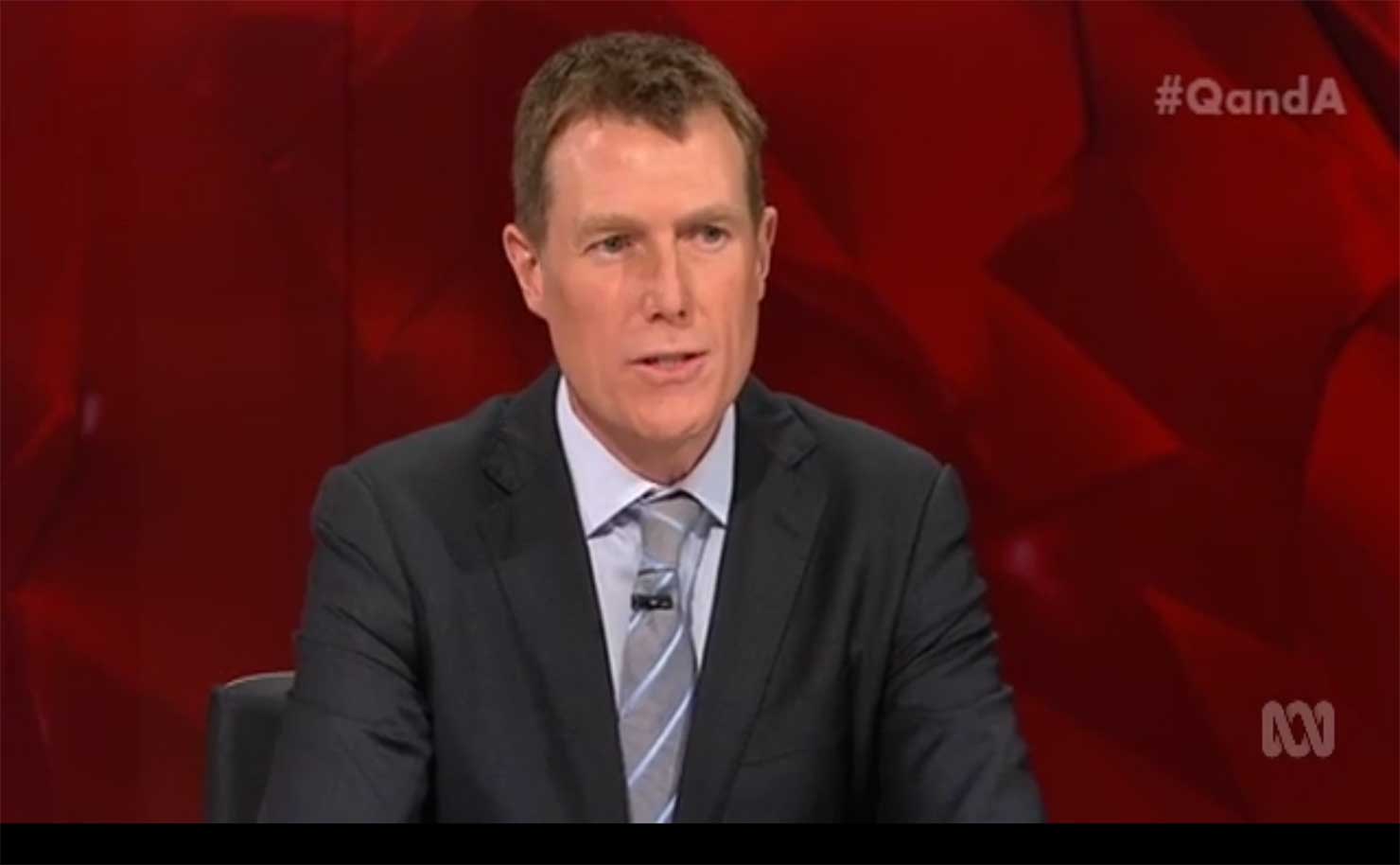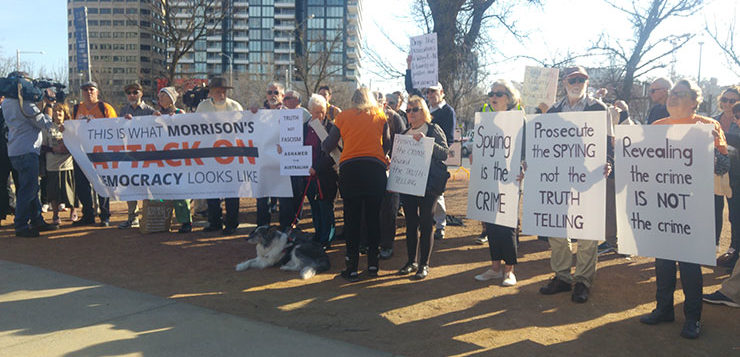If the conduct of the Commonwealth government in the scandal surrounding the bugging of Timor-Leste’s embassy is anything to go by, Australia’s democracy might not be as robust as we think, writes Madeleine Miller.
At a conference in Sydney on the 19thof August, silk and President of the International Law Association, Christopher Ward invited the Attorney General, Christian Porter to speak to a room of over 100 distinguished international lawyers from across the world. The subject was the rule of law.
As the leadership spill ensued, Porter sent shadow minister for finance, David Coleman, to read his speech. Through Coleman, the Attorney General spoke of the gravity of his role as carrying “a great privilege and fundamental responsibility” and the rule of law as “crucial in promoting stability, ensuring everyone is equal before the law… and a pillar upon which our engagement abroad rests.”
According to Porter, “Australia’s firm commitment to the rule of law is no better illustrated than through the historic maritime boundary treaty that we signed in March this year.”
In a somewhat ironic twist, ILA President, Christopher Ward emerged at the ACT Magistrates Court last Wednesday as Bernard Collaery’s legal representation. Collaery is the lawyer for Witness K, a former Australian Security Intelligence Service (ASIS) official discharged after questioning the authority of ASIS to send spies posing as foreign aid workers to plant listening devices in Timor Leste’s cabinet room during oil negotiations with Australia in 2004.
The person responsible for authorising the charges against Collaery and Witness K was the Attorney General, Christian Porter.
While the media has been fixated on the spitfire between Peter Dutton, Roman Quaedvlieg and au pairs, this case which speaks volumes about ministerial integrity and anti-corruption is sailing under the radar for most Australians. Labor’s dirty hands in this decade long shame, is pushing this case to the deathly silence of the sea floor. This trial should be at the surface, generating waves and rocking Australia out of complacency.
This case is not simply about whistleblower protection (Collaery argues that it is not about whistleblowers at all) – but cuts much deeper to the integrity of our democratic system.
It exposes the significant deficiencies in the protection of the rule of law in Australia which cannot be whitewashed by glossy tales of treaty signing with Timor-Leste, after decades of playing dirty.
It is fitting that this case appeared before a Magistrate around the anniversary of 9/11. Since 9/11, Australia has introduced over 60 pieces of federal counter terrorism legislation. This deluge of national security legislation has eroded significant aspects of the rule of law, and Bernard Collaery and Witness K have become examples of what can be caught in the trawler net of counter terrorism legislation.
What is the rule of law?
The rule of law is the foundation of our democratic system, but you won’t find it mentioned in the constitution. It is an inference. In its most basic form, it means that we are subject to laws created by our elected representatives, but so are our elected representatives; everyone is equal before the law.
However, the steadfast understanding of the rule of law is that equality before the law depends upon checks and balances on the use of power, freedom of speech, transparency and access to confidential legal advice.
What the prosecution of Collaery and Witness K illustrates is that our intelligence agencies are not equally accountable for breaking the law, and that political revenge can be the catalyst for bringing a proceeding before the court.
Equality before the law
While charges have been laid against Collaery and his client, the Australian Federal Police, to our knowledge, have not investigated the alleged unlawful activity of ASIS in the bugging of Timor Leste’s cabinet, despite a request from Independent MP Andrew Wilkie, Centre Alliance MP Rex Patrick, and Greens Senator Nick McKim.
Surely it is a question of significant public interest whether or not espionage for oil companies in a commercial negotiation on a poor foreign neighbor is a ‘proper purpose’ for our intelligence agencies under our domestic law?
Attorney General
The Attorney-General is a gatekeeper of the rule of law, tasked with promoting, preserving and protecting it. The Attorney General has the power to initiate and end criminal proceedings. However, the role of Attorney General is inherently frustrated by the fact that they are also an elected politician, who is answerable to his or her party.
Whether prosecuting is in the ‘public interest’ is a juggling act of perceived independence and keeping your party afloat. Only with significant public pressure can the integrity of this role be upheld.

With Labor keeping its mouth shut about this case (except of MP Julian Hill who denounced the charges on Tuesday), the Attorney General’s decision to prosecute Collaery and Witness K in the ‘public interest’ has been left largely unchallenged. Porter has made no public statement to clarify how he concluded that the prosecution is in the public interest.
IGIS
The Inspector General of Intelligence Services is an office tasked with ensuring that our intelligence agencies “act legally and with propriety, comply with ministerial guidelines and directives and respect human rights.”
However, the power of this watchdog is undermined by the requirement that the IGIS report to the minister. The function of the IGIS presumes that the Minister was not involved in the wrongdoing. There is also a cognisable issue with independence as it is situated within the Department of Prime Minister and Cabinet.
Collaery has claimed that his client went to the IGIS to report the unlawful bugging of Timor Leste’s cabinet and was given approval to seek legal advice. It is alleged his employment was then terminated. The IGIS has subsequently denied being approached by Witness K.
Questions remain to be answered who knew about the alleged bugged operation and who delivered the direction.
Public Service’s whistleblower laws
The Public Interest Disclosure Act, the federal whistleblower protection law, excises intelligence officials from the ambit of its protection, and does not protect those who blow the whistle on wrongdoing by politicians.
Absence of a federal integrity commission
Two men who were extensively involved in the Timor Sea issue at the time Timor-Leste’s cabinet was bugged – Foreign Minister Alexander Downer, and the Secretary of the Department of Foreign Affairs, Ashton Calvert – have both gone on to take up positions at Woodside, the primary beneficiary of the oil in the Timor Sea.
Former Labor Ministers for Energy and Resources, Gary Gray and Martin Ferguson, have also both gone on to roles associated with Woodside.
The integrity of Ministerial decisions is further muddied by the fact that Woodside has donated over $1.4 million to the major parties over the last decade.
In the absence of a federal integrity commission, the integrity of ministerial decision-making will continue to be one of doubt, and little consequence.
Senate oversight
Unlike the United States, the Australian Senate and the Parliamentary Joint Committee on Intelligence and Security has very little oversight over the work of our intelligence agencies beyond administration and finance.
International Law
Australia is not ‘bound’ by international law. When Australia signs an international treaty, it does not automatically become law in Australia. This is unlike many countries throughout the world, including the United States where it automatically becomes domestic law without the need for legislation. Although international law may inform Australian courts’ interpretation in some circumstances where there is ambiguity, that is the extent of it.
A core tenet of international law on treaties (in which Australia is a signatory) is negotiation in good faith. Spying in the circumstances Australia did was an abject breach.
Anticipating independence was imminent, two months before the vote Australia withdrew from the jurisdiction of the International Court of Justice and rejected the jurisdiction of the International Tribunal of the Law of Sea.
Human Rights
Unlike most democracies, Australia does not have a human rights charter, and limited protection of human rights in the constitution. Only two Australian states have human rights bills. No piece of Australian law lays out the rights attaching to Australian citizenship. Collaery and Witness K’s case will be a real test of the fallibility of Australian human rights protections.
Right to Free speech
Both Collaery and Witness K face charges under the Intelligence Services Act, for communicating information about ASIS – Witness K as a former ASIS official, and Collaery as someone who has a contract or agreement with ASIS.
However, Collaery has been at pains to point out to the media, Witness K did not ‘blow the whistle.’ The only communication he engaged in was with his lawyer, and he was intending to give evidence at the private proceedings of the Permanent Court of Arbitration, and not to the public.
As Witness K’s lawyer, Collaery is arguing he was and is not under any contractual agreement with ASIS. As a lawyer he owes a duty foremost to the court and to serve the best interests of his client.
Intending to push on with the publishing of his book about Australia and Timor Leste in January next year, Collaery is turning up the dial of his fight against the dilution of freedom of speech by counter terrorism laws.
Client legal privilege
The confidentiality of communication between a lawyer and his client however, is a very well-established principle of the rule of law and is seen as essential to the justice system. Yet, in the name of “national security”, ASIO bugged Collaery’s office and Witness K’s home and conducted raids in 2013, signed off by the Attorney General and not the court.
Collaery argues this would never have been signed off by judicial officer, for the legal profession is underpinned by client legal privilege (confidential communication between lawyer and client). Intercepting this communication is considered a miscarriage of justice and the jeopardization of a right to a fair trial.
The International Permanent Court of Arbitration agreed and ordered the Australian government to return all of the seized material to Collaery.
Right to a public trial
“National security” was the focus of the directions hearing, with the prosecution determined for the case to be heard behind closed doors. The right to a trial to be heard in public, is another well-established principle of the law that counter terrorism legislation may have again usurped.
At his last appearance before the media on 12 July, Collaery pleaded to the media that they are the soul of justice.
How the court will preside this case is of huge significance to all Australians. It may just expose that our foundations as a free and democratic society are not as fortified as we think.
Collaery and Witness K’s case will next be heard on 29 October at 9am at the ACT Magistrates Court.
Donate To New Matilda
New Matilda is a small, independent media outlet. We survive through reader contributions, and never losing a lawsuit. If you got something from this article, giving something back helps us to continue speaking truth to power. Every little bit counts.




